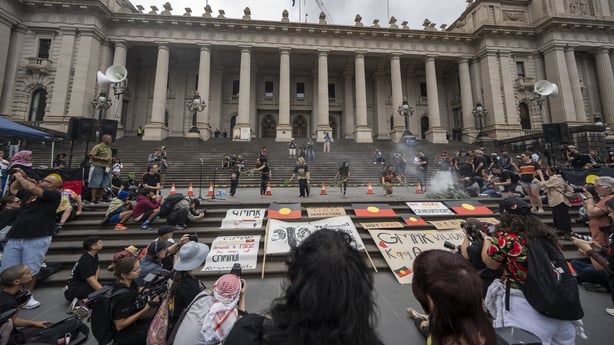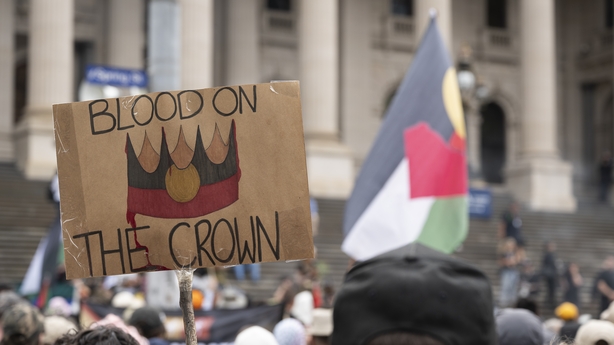Tens of thousands of Australians protested over the treatment of Indigenous people as the country celebrated a national holiday marking the 1788 arrival of British colonisers.
Crowds rallied in Sydney, Melbourne and other cities on Australia Day, decrying the high incarceration rates, poor health and historic persecution of Aboriginal people, whose ancestry stretches back 60,000 years.
The 26 January national day commemorates the arrival of a British fleet in Sydney Harbour to establish a penal colony.
For many Australians, it is a day to celebrate with friends and family at beaches and backyard barbecues.
But for rights activists "Invasion Day" marks a period of oppression of Indigenous peoples, including the dispossession of their lands, massacres, and the removal of children from their families.
In Melbourne, thousands of demonstrators took to the streets, some brandishing placards proclaiming "Abolish the Date" and "No Pride in Genocide".
"When white people came to Australia, black people started dying. Like, why do you choose that day? It's insane, I don't understand," protester Andrew Baker said.

"It's a day of mourning for me and my mob," said Indigenous woman Tammy Miller.
"It's about changing the date, but it's more about making people aware of our injustices that have been since and still ongoing since white man came," Ms Miller said.
"We're still here fighting the same things that my grandparents were, but seeing all the people here makes me so proud," she added.
Two historic statues were damaged in Melbourne ahead of Australia Day celebrations.
A statue of colonist John Batman, a founder of the country's second largest city who was also involved in killings of Indigenous people, was sawn in half, while a monument commemorating Australian soldiers in World War I was daubed in red paint, with the words "land back," in the early hours of yesterday morning, local media reported.
At a citizenship ceremony in Canberra for 24 immigrants - one of nearly 300 held around the country - Prime Minister Anthony Albanese hailed "the unique privilege that we have of sharing this oldest continent with the world's oldest continuous culture".
"It is a responsibility all of us owe to future generations to safeguard our social cohesion, to uphold Australian fairness and continue Australia's progress," he said.

In Sydney, the artwork of Wiradjuri-Biripi artist James P Simon was projected on to the sails of the Opera House, as part of many dawn ceremonies around the country to be followed by protests and festivities throughout the day.
In Melbourne's central business district, local shopkeepers had been warned to expect as many as 30,000 people marching through the streets, local media reported.
The choice of 26 January as the national day has long divided Australians.
A Resolve Strategic survey published on Friday in the Sydney Morning Herald indicated support for the holiday date had grown over the past two years from 47% to 61%.
Attitudes appeared to have hardened since a constitutional referendum on Indigenous rights reforms was heavily defeated on 14 October 2023, the paper said.
An estimated 3.8% of Australia's 26 million people are Indigenous, official data shows.
Indigenous people still have a life expectancy eight years shorter than other Australians, higher rates of incarceration, more youth unemployment, and poorer education.

